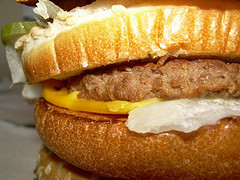McDonald’s Calls For Definition Of “Sustainable” Beef Image courtesy of (Morton Fox)
In an interview with Bloomberg, McDonald’s VP of sustainability says about two-thirds of the company’s carbon footprint comes not from the many thousands of eateries, but from the supply chain that provides the ingredients to the restaurants:
The biggest sustainability impact is the raising of the cattle in the fields and ranches, which is about three to four steps removed from McDonald’s.
Can we say we’re buying any sustainable beef today? No, we can’t. Could we be buying sustainable beef? We might be. What I mean by that is that there are no standards, measures, accountability and traceability to make those claims today.
But lest you think this is a request for the federal government to come up with sustainability standards, he adds that McDonald’s is hoping to “use our size and influence to work with the industry and NGOs [non-governmental organizations] to come up with definitions of sustainable beef.”
On the question of whether buying locally raised food is more environmentally friendly, the VP claims that locally grown may not always be the most efficient.
“We’ve done our analysis of transportation impacts,” he explains. “It’s one of the smallest slices there is, in terms of our own profile. Sometimes it can be more efficient to do it elsewhere and use transportation to move it somewhere else because the production is more efficient.”
McDonald’s Wants to Know Whether Its Beef Is Sustainable [Bloomberg]
Want more consumer news? Visit our parent organization, Consumer Reports, for the latest on scams, recalls, and other consumer issues.


